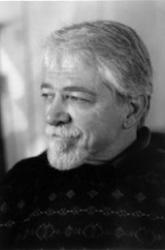The bloated street, fat with crowds and voices,
young faces gleaming under rain and street lights,
slumping lumps of bodies under ponchos; and the human
microphone: call and response, a kind of tribal summons,
but weird, like ghost chants among stone tombs
where slept, awhile, the noctural gods of Wall Street.
and the old man’s story comes back to me outside
a deserted bank in Oklahoma robbed in 1933
when locusts wedged between sandstone bricks
throbbed their little desperation song, days on end
standing like rotting fence posts along dry fields, the air
a wall of red dust, Black Bear creek a bloodless scar,
and the horse people of the Oto long since gone away.
his voice hardened into something thin and brittle
because somehow, he said, somehow then, he thought,
in this flat Baptist land of good deeds and bad money
where preachers, fathers of the faith, ranted against
every form of wickedness except the kings of poverty,
the men who pulled the strings and foreclosed on half
the farms in Oklahoma, somehow the scabby hand
of vengeance was alive and real and moving slowly
through the land and dusty streets of small towns
like this one because the third thief placed the nose
of his 12-gauge beneath the bank president’s chin,
then said, This, sir, is what happens when banks
are built on the broken backs of the people, and
the sound was terrible, and the streets were empty.
ISSUE: Spring 2012







